The Street Children of Manila
To return to my homepage please go to www.cyclinghomefromsiberia.com
The following update is focused on the three weeks I spent in Manila visiting various Viva Network partner projects (mostly to do with Street Children).
“Tell me, I will forget.
Show me, I may remember.
Involve me, I will understand.”
– Chinese Proverb
“If we do not act, we shall surely be dragged down the long, dark, and shameful corridors of time reserved for those who possess power without compassion, might without morality, and strength without sight.”
-Martin Luther King Jr.
“When one child dies every 3 seconds just because they’re poor, you can’t stand by and let it happen”
– Make Poverty History campaigner, Berkhamsted, UK
Sunday morning in Manila: smog and noise rise from the vast elongated traffic jams which snake between glamour malls and horror slums in this hyper-congested mega-capital of The Philippines. I am struggling to push my way through a heaving mass of humans – heading for church and attempting to keep up with my Filipino pastor friend who walks ahead of me somewhere amidst the jumble. Crossing the main road on an overpass we are funneled down a one way staircase back to street level. Half way down the steps I notice a sad collection of children sitting against the wall amidst our fast moving feet. Dirty baby faces and unevenly shaven heads, aged between about
five and ten years old, their grubby hands hold up broken plastic cups for money and their big brown eyes (crusted with muck) plead, plead, plead. What is their world like?
One little boy hops to his feet as I pass and grabs hold of my trousers – he does not say anything, but he will not let go. His face is a little desperate scowl, his eyes implore at mine. “I cannot give you money little chap”, I justify to myself, “surely you are part of the begging syndicates which are well known in these parts – anything I give will be snatched away by the big man who sends you daily to the streets to beg for his hierarchy”. But the little boy keeps walking with me and now his little hand is pointing to the convenience store stacked with cheap food which we are passing… but I will not stop, I cannot lose my guides, we are already late. And then suddenly he leaves me with my excuses and goes back, still hungry, to his begging spot by the stairs. I go to church with swimming eyes.
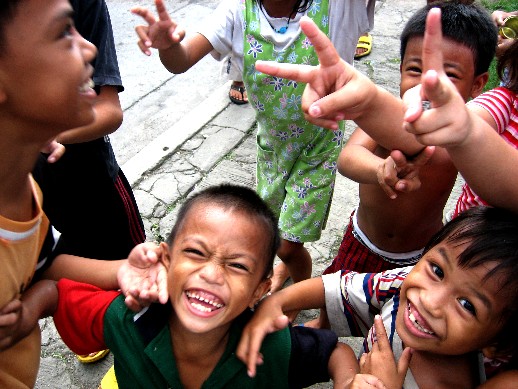
Shanty Town Kids
It would be very wrong to leave the impression that the good people with whom I am privileged to spend much time in Manila are inactive or unmoved by the horrendous inhumanity and desperation they see daily on their door steps. Firstly there are the various refuge centers and homes they run which will clothe, feed, educate and care for the children. One day I am taken on a tour of a cemetery where some of the street children live – a place which appears not so far from hell on earth – drugged up nine year olds sniff brain-frying glues, feverish dehydrated babies lie on concrete tombstones, adolescents sleep in the unused grave chambers. The reasons why children end up on the streets like this are varied, but very often they are running away from families where they are horrendously neglected, abused, or plain abandoned. I accompany one street children’s camp out of the city for a few days – it is hoped that by taking them straight off the street onto a camp such as this, enough trust can be built up with them that they might chose to leave their perilous street lives behind and join a refuge or home. Upon arrival the dishevelled children are given fresh clothes and a wash bag… within an hour they are transformed into clean, happy faces – playing basketball and messing around on swings and see-saws. There is laughter everywhere. This is all only possible because of the awesome dedication of the staff. However, persuading the children to leave their hazardous street lives and come to a charity for help is only the first step in a long difficult road to them becoming whole, healed, humans.
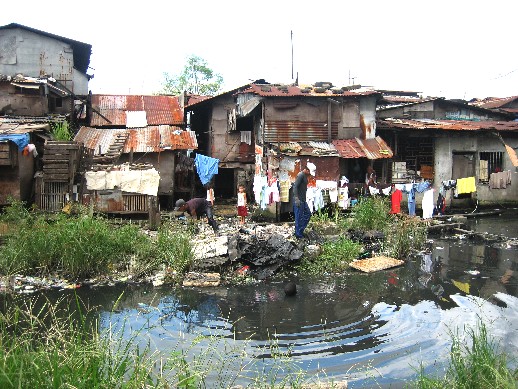
There is a man swimming in the dirty water next to this slum
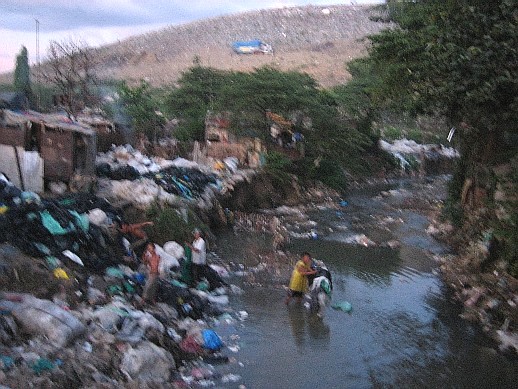
Collecting rubbish to recycle from the river. Also notice the Piata Rubbish Dump behind where 30,000 people make a living looking for things they can recycle.
You can tell I am impressed by such efforts and achievements. But of course the scale of the problem is huge. There are estimated to be fifty to seventy thousand street kids in Metro-Manila alone (Reference: Action International Ministries) and of course there are also many more millions of children at risk around the world from starvation, preventable/deadly diseases, abuse, exploitation and war (without wanting to numb our brains with statistics, one horrifically vivid illustration is that the numerical equivalent of one jumbo jet packed with kids crashes killing all on board EVERY 15 MINUTES OF EVERY DAY… that is how many kids are dying of preventable causes as we sit at our computers…imagine how much coverage that would get in our papers if they were western kids in each plane).
On another note, from my brief glimpses of horror and grace in Manila, I am also now aware of just how difficult it must be for the workers who spend their lives trying to help street children. I have seen how tiring and emotionally draining it is for them – and they must often feel the strain is almost too much (I used to find teaching in a UK high-school tiring enough). The charity which I am endeavoring to help on this big bicycle ride, Viva Network, focuses on the huge problem of children at risk around the world – but rather than setting up new undertakings, their focus is much more on trying to support, network and encourage existing projects. Viva Network is a Christian charity which was founded upon the realization that there are already many well intentioned schemes around the world, trying in all sorts of ways to provide children with safety, healing and hope… however, many of these projects flounder and fail to achieve their potential due to lack of training, lack of support for staff, and the unfortunate inefficiency of not being connected with other similar projects in the same area. Viva Network has now set up 77 networks in 45 different countries and their effectiveness is such that in just a dozen years since they started they are now in Roster Consultative Status with the United Nations. On a large scale they help connect charities and so avoid wastage of resources – recently in Sri Lanka’s tsunami relief efforts SEVEN HUNDRED THOUSAND pounds (UK) was saved when one charity, intending to spend this money on school packs for kids, was networked with another charity who had just such a surplus of kits – which it was happy to pass on, thus saving the money to be spent on something else. A more local level example in Bolivia involved several urban street children feeding projects who were brought together to meet each other for the first time. They quickly discovered that they were all operating their feeding projects on the same night of the week – meaning the children had plenty of choices for food on that one night of the week, but none at all on the other nights. Having met, they were hence able to co-ordinate their efforts across the week… with further collaboration, later on, they began to purchase their food together in bulk and thus saved money to cover every night of the week.
In Manila, most of the charities I met had close ties with Viva Network. They appreciated not only the training opportunities, but also the sheer encouragement and refreshment which they benefitted from as they met fellow-workers and went on occasional retreats. A burnt out worker is no good to anyone, however good their intentions be when they start. Viva Network, as I have tried to show here, plays a vital role in enhancing and encouraging thousands of tireless and compassionate projects around the world. This explanation is naturally very condensed, so please do find out more about Viva Network and their goal of “working together to bring more children better care” at www.viva.org .
I believe it is good for us to periodically re-stir our consciences… as the Make Poverty History Campaign insightfully pointed out, the travesty of our age is not so much that a child dies every three seconds from preventable causes, but rather that a child dies every three seconds and we (rich) could stop it if we really wanted to (though of course we must acknowledge that there are other causes for poverty besides lack of money). If it is true that (in the west) we often “buy things we do not want to impress people we do not like”, perhaps we should bravely test out this Christmas whether rather it might indeed be more blessed to give than to receive…?
Since Manila, I have cycled down the length of the Philippines to the southern island of Mindanao. I now nervously await the departure of a Muslim cargo ship bound for Indonesia sometime tomorrow. This update is already too long, and I apologize (a little) if it is a bit heavy. My next update will be all about life on the road in these Eastern Archipelagos as I make my way towards (apparently rather wild) Papua New Guinea.
Finally, on a much more cheerful note (and in case you do not already know), Al Humphreys (the guy who I cycled through Siberia with and who is in many ways responsible for getting me started on this whole variety show) has finally made it home to England and completed his 46,000 mile, 4 year, spectacular Round The World By Bike expedition ( www.roundtheworldbybike.com). This quote is dedicated to his stupendous achievement, from which we can all learn.
“It is not the critic who counts: not the man who points out how the strong man stumbles or where the doer of deeds could have done better. The credit belongs to the man who is actually in the arena, whose face is marred by dust and sweat and blood, who strives valiantly, who errs and comes up short again and again, because there is no effort without error or shortcoming, but who knows the great enthusiasms, the great devotions, who spends himself for a worthy cause; who, at the best, knows, in the end, the triumph of high achievement, and who, at the worst, if he fails, at least he fails while daring greatly, so that his place shall never be with those cold and timid souls who knew neither victory nor defeat.”
– Teddy Roosevelt
As always, many thanks for your prayers, emails and kind donations to Viva
Network (please go to www.justgiving.com/cyclinghomefromsiberia if you would
like to support their work).
Rob
www.cyclinghomefromsiberia.com
40,000 KM, 3 years, 30 countries
(so far involving… ice beards, frozen Siberian rivers, camping at minus forty, past Mount Fuji, through Shanghai, sailing out of Hong Kong to the Philippines, meeting the Street Children of Manila…)
To receive free monthly email updates about my progress/adventures please send a blank email to cyclinghomefromsiberia-subscribe@googlegroups.com
(if you feel like, why not leave a message on my blog comment board on this site…)
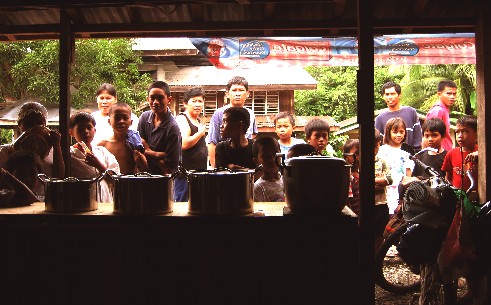
Friendly people watching me eat!
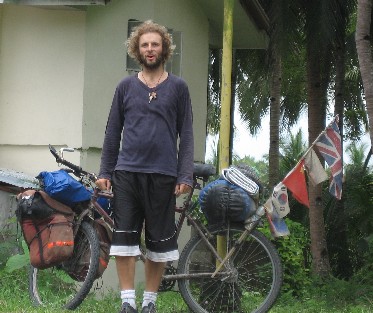
Tropical cyclist (quite hot!)
Tags: The Philippines and Indonesia

December 10th, 2005 at 3:13 pm
hey, im from brent international school, you visited us about a month ago, congratulations on this journey, i hope you saw more of the philippines than its street kids and shanties. all the best of luck.
December 17th, 2005 at 3:41 am
Hi. Im also fron Brent International School!!Good luck! nd take care!
December 17th, 2005 at 3:41 am
Hi. Im also fron Brent International School!!Good luck! nd take care!